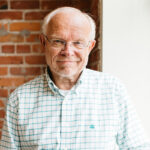Outside Chris’s bakery, Oak Harbor, WA, he carried a box of a dozen of the most colorful doughnuts in the bakery. He was parked next to us. I heard him singing as he prepared to climb into his truck. I said with a smile, “You haven’t had a doughnut yet; how can you be singing?” He smiled back and replied with joy on his face and delight within, “I have Jesus. I can sing anytime.”
Wendy and I both felt his joyful conviction. I started my morning by taking our dog, Mackenzie, out to the backyard. My daily morning prayer is a greeting of adoration, an old Jewish prayer: “Blessed are you, Lord God, King of the universe.” And “This is the day the Lord has made, let us rejoice and be glad in it.” Just moments later, we experienced this man’s testimony of praise. Yes, he testified, first in song and then in naming Jesus as the reason for his joy.
Personal songs of joy
Eugene Peterson said, “The end of prayer is praise.”[1] “Book of Praises” is the Hebrew title for what we might call the Psalms. The word “Psalms” comes from the Greek word “psalmoi,” which means “songs.” So, prayers are directed to God and fulfill the meaning of Psalm 150:6 (KJV): “Let everything that hath breath praise the Lord.” I love the term Eugene used for surprising testimonies of praise: praise eruptions. “Praise, when we least expect, in places we never would have guessed, erupts.”[2]
We cherish “the discipline” of daily prayer, liturgical songs of praise, and the rhythms of prayer. Can we also embrace the spontaneous moments we find ourselves (or others in the parking lot) unable to hold back their personal songs of joy?
Do you see this?
“The Psalms come from a people who hear God speak to them and realize that it is the most important word they will ever hear spoken. They decide to respond. They answer….
The Hebrews prayed….
They knew themselves addressed by God. They responded to the presence; they answered the address; they prayed….
“The psalms are the liturgy of those who concern and delight is the torah of the Lord”.[3]
Praise erupts—We sing
Give thanks with a grateful heart
Give thanks to the Holy One
Give thanks because He’s given Jesus Christ his son
And now,
Let the weak say I am strong.
Let the poor say I am rich.
Because of what,
The Lord has done for us.
Give thanks.[4]
Praise erupts in the places we least expect—a bakery parking lot, a fleeting moment, a voice unsilenced. We honor the rhythms and the discipline of prayer. But can we embrace the unchained song? The psalms are born from listening hearts, from those who hear and know— God speaks. We answer. We sing.
Let’s keep our ears open today and in the week ahead. God’s presence just might fill the air with song and a surprising voice to testify: “I have Jesus. I can sing anytime.”
_______________________________

Keith Anderson, D.Min., is a Faculty Associate for Spirituality and Vocation at VantagePoint3 and President Emeritus of Seattle School of Theology and Psychology. He is the author of several books, including his most recent: On Holy Ground: Your Story of Identity, Belonging and Sacred Purpose (Wipf & Stock, 2024). His other works include Reading Your Life’s Story (IVP, 2016), A Spirituality of Listening (IVP, 2016), and Spiritual Mentoring (IVP, 1999). In his writing, teaching, and mentoring, Keith seeks to set a table for people looking to enter the “amazing inner sanctuary of the soul” in the most ordinary and extraordinary moments of life.
[1] Eugene Peterson, Answering God: The Psalms as Tools of Praise, p. 121
[2] Peterson, p. 123
[3] Peterson, p. 14,15,25
[4] Henry Smith, Give Thanks with a Grateful Heart, The Church of Scotland Music, note: the composer of this song suffered from a degenerative condition that made him legally blind.







